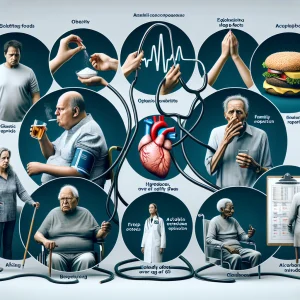Explore the Dangers of Hypertension and Its Effects on Your Health
High blood pressure, commonly referred to as hypertension, is a prevalent medical condition impacting millions of adults around the world. Many individuals remain unaware of their hypertension status due to the often subtle or non-existent symptoms associated with the condition. This elusive quality makes hypertension particularly hazardous, as untreated cases can escalate into severe health issues, such as heart disease and stroke. Regular blood pressure assessments are crucial for early identification and effective management, helping to keep your levels within a healthy range and significantly reducing the risks linked to this silent health threat.
Making small yet significant lifestyle adjustments can greatly aid in the effective management of your blood pressure. Simple decisions, such as adopting a nutritious diet rich in fruits, vegetables, and whole grains, are essential in maintaining healthy blood pressure levels. Furthermore, prioritizing restorative sleep and implementing stress-reduction techniques can enhance cardiovascular health and overall wellness. By embracing these lifestyle changes, you not only boost your heart health but also significantly improve your overall quality of life.
 The Critical Importance of Measuring Blood Pressure for Optimal Health
The Critical Importance of Measuring Blood Pressure for Optimal Health
Blood pressure is defined as the force that circulating blood exerts against the walls of your blood vessels. This crucial measurement is influenced by the heart’s pumping action and serves as an indicator of how effectively blood circulates throughout your body. Maintaining a normal blood pressure is vital for overall health since elevated levels can lead to severe consequences, including heart attacks and strokes. Regularly monitoring your blood pressure enables you to catch any concerning changes early, which facilitates timely intervention and management.
Blood pressure readings are expressed in millimeters of mercury (mmHg) and consist of two key values:
- Systolic Pressure – This is the first, higher value that measures the pressure in your arteries when your heart beats and pumps blood.
- Diastolic Pressure – This is the second, lower value that indicates the pressure in your arteries when your heart is at rest between beats.
For instance, a reading of 120/80 mmHg signifies a systolic pressure of 120 and a diastolic pressure of 80, which is regarded as normal. Regular blood pressure monitoring is essential for maintaining awareness of your cardiovascular health.
Identify the Causes and Risks Linked to High Blood Pressure
High blood pressure can arise from various factors, predominantly associated with the narrowing of arteries that increases resistance to blood flow. This heightened resistance can elevate blood pressure levels, causing considerable strain on vital organs such as the kidneys, heart, brain, and eyes. Over time, untreated hypertension can lead to severe health complications, particularly those related to cardiovascular disease, which can profoundly affect both health and longevity.
Blood pressure can fluctuate for multiple reasons, and healthcare professionals categorize readings based on established guidelines:
Low blood pressure – 90/60 mmHg or lower
Normal blood pressure – Ranging from 90/60 mmHg to 120/80 mmHg
High blood pressure – 140/90 mmHg or above
A reading between 120/80 mmHg and 140/90 mmHg indicates an increased risk of developing hypertension in the future. However, it’s crucial to recognize that individual blood pressure norms may vary, making it essential to consult with your healthcare provider to comprehend your unique situation and thresholds.
 Investigating the Main Risk Factors Contributing to High Blood Pressure
Investigating the Main Risk Factors Contributing to High Blood Pressure
Although high blood pressure does not have a single identifiable cause, numerous risk factors can contribute to its increase. Some of the primary contributors include:
- Being overweight or obese
- Smoking
- High-sodium diet
- Family history of hypertension
- Excessive alcohol consumption
- Lack of adequate sleep
- Insufficient physical activity
- Aging, particularly after 65 years
- Ethnic background, especially Caribbean or African descent
Many of these risk factors can be modified through deliberate lifestyle changes. In rare instances, high blood pressure may be the result of specific medical conditions or medications, affecting approximately 1 in 20 individuals. These underlying conditions may include:
- Thyroid disorders
- Kidney diseases
- Diabetes
- Use of steroids
- Hormonal contraceptives
- Recreational drug use, such as cocaine
Recognizing the Subtle Symptoms of High Blood Pressure
One of the primary challenges associated with hypertension is its tendency to manifest without clear symptoms, causing many individuals to remain unaware of their condition. In the UK, it is estimated that nearly 25% of adults live with undiagnosed high blood pressure. The most reliable way to assess your blood pressure status is through regular testing, which can facilitate early detection of potential issues and enable appropriate management strategies.
You can have your blood pressure checked at various locations, including:
- Your doctor’s office or with a healthcare professional—simply request a blood pressure check during your visit.
- Many local pharmacies offer blood pressure monitoring services.
- Some workplaces may provide health screenings for employees.
- At home, you can utilize a personal blood pressure monitor for regular self-checks.
 Effective Strategies to Lower Your Blood Pressure and Improve Health
Effective Strategies to Lower Your Blood Pressure and Improve Health
Since lifestyle choices play a significant role in high blood pressure, implementing targeted changes can help mitigate your risk. Here are four essential strategies to consider:
Commit to Regular Physical Activity
Incorporating physical activity into your daily routine is crucial for maintaining a healthy heart and blood vessels, which can, in turn, help lower blood pressure levels. Excess weight places undue strain on your heart, forcing it to work harder to pump blood efficiently. By engaging in regular exercise, you can shed excess pounds and improve your cardiovascular fitness, both of which are vital for effectively lowering blood pressure.
Adopt a Heart-Healthy Diet
Embracing a well-balanced diet that emphasizes whole foods—such as fruits, vegetables, and lean proteins—can substantially aid in lowering blood pressure. Since high sodium consumption is known to elevate blood pressure, it’s crucial to restrict your salt intake. The NHS recommends keeping your salt consumption below 6g per day, roughly equivalent to a single teaspoon. Consider reducing your intake of processed foods that are high in salt, and utilize herbs and spices as healthier alternatives to enhance your meals.
Limit Alcohol Intake
Reducing both the quantity and frequency of alcohol consumption can positively influence your blood pressure management. Incorporating alcohol-free days into your weekly schedule and spacing out your drinking days can be advantageous. Although the NHS advises a maximum of 14 units of alcohol per week—approximately equal to 7 pints of 4% ABV beer or 7 glasses of 175ml wine—it’s essential to remember that consistently reaching this limit may not be necessary for everyone.
Prioritize Quality Sleep
Chronic sleep deprivation can significantly increase the likelihood of developing high blood pressure. The NHS recommends aiming for 6 to 9 hours of restorative sleep each night to promote overall health and sustain healthy blood pressure levels. Establishing a calming bedtime routine and creating an environment conducive to sleep can greatly enhance your sleep quality, contributing to better blood pressure management over time.
Presented By: Private Blood Pressure Tests
The Article Blood Pressure Test Explained: What You Need to Know Was Found On https://limitsofstrategy.com
Credible References for Further Information:
Blood Pressure Test Explained: What You Need to Know



You’ve raised some important points about the stealthy nature of hypertension and its severe implications for our health. I can truly relate to the struggle of managing blood pressure—it can feel overwhelming at times, especially when navigating the wealth of information out there about what constitutes a ‘healthy lifestyle.’
This post highlights an often-overlooked aspect of health that truly deserves our attention. I can personally relate to the subtle nature of hypertension; a few years ago, I discovered my own elevated blood pressure during a routine check-up despite feeling perfectly fine. This experience made me realize how critical it is not only to regularly monitor our health but also to educate ourselves on lifestyle choices that can mitigate these risks.